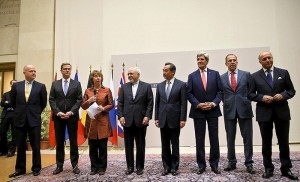 This round of talks on Iran's nuclear program has been marked by all sides publicly setting the lowest of expectations, despite the win-win attitude following an interim deal reached in Geneva last November.
This round of talks on Iran's nuclear program has been marked by all sides publicly setting the lowest of expectations, despite the win-win attitude following an interim deal reached in Geneva last November.Few diplomats spoke to journalists as the second day of talks continued � and that is a good sign, say analysts. Talks are expected to wrap up�Thursday morning, enabling European officials to deal with the crisis in Ukraine. A senior Iranian diplomat told the Monitor that the process was "moving in the right direction," but that a comprehensive deal was far from certain.
But two developments in the months since diplomats last met have put Iran on the defensive and could complicate the process, the Iranian official said: the sudden focus on Iran's ballistic missiles and US officials' portrayal of the deal as a loss for Iran � messages for domestic consumption, but problematic nonetheless.
Iran's ballistic missiles, which�could potentially one day carry a nuclear warhead, have not been raised in two years of negotiations. But the US recently emphasized the issue�as part of United Nations Security Council�resolutions�on Iran,�which Tehran sees a possible bid to move the goalposts.
The Iranian official, who asked not to be named because talks are continuing,�said the discussion of missiles in the context of talks to ensure Iran never has a nuclear weapon is �extraneous"�and a "red line" for Iran.
�If that is the case ��if Iran has proved that it is not going in that direction [toward nuclear weapons] ��what is the utility of talking about the missiles capable of carrying nuclear warheads?� he asks.
Statements from ranking Americans since the�Nov. 24�Geneva deal portraying Iran as losing out�also �have not been helpful," he says.
He brings up comments from US Secretary of State John Kerry that there was �no� acceptance in the Geneva deal for future uranium enrichment on Iranian soil � even though it is described in the document as commensurate with Iran�s �needs.� �Other top US officials have stated that Iran would still suffer economically despite modest sanctions relief, or that sizable parts of Iran�s nuclear program would be �dismantled.� President Barack Obama has said repeatedly that military options remain if diplomacy fails.
�When President Obama says �all options are on the table,� the intention is not that important, whether he was saying it for domestic consumption, or he wanted to silence the neoconservatives, or the Israeli lobby in Washington; that is secondary,� says the senior Iranian official. �The first issue for us is that he is, somehow, using the same language as he used to do, and that cannot be acceptable for us.�
As a result "We have to convince our general public and our officials that there is a benefit for Iran for the continuation of these talks, because they are asking� if Americans really want to have a deal with Iran,� says the Iranian official.
In mid-January, President Hassan Rouhani said the Geneva deal "means the surrender of big powers before the great nation of Iran." And this week Supreme Leader Ayatollah Ali Khamenei spoke of "the�ugliness, the violence and terror [of] this [American] face."
But Iran analyst Reza Marashi cautioned that there is likely more flexibility than there seems to be.
�At the beginning of any negotiation you set red lines. That�s to be expected. The P5+1 and the Iranians have done it,� says�Mr. Marashi,�the director of research for the National Iranian American Council, speaking in Vienna. �But they know just as well as we know that red lines become flexible lines, once the negotiations start. They have to, otherwise there is nothing to negotiate over.�
By The Christian Science Monitor
The Iran Project is not responsible for the content of quoted articles.










